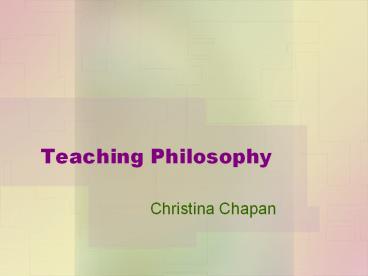Teaching Philosophy - PowerPoint PPT Presentation
1 / 13
Title:
Teaching Philosophy
Description:
Famous Quotes 'No one has yet fully realized the wealth of sympathy, kindness, and generosity ... I identify with the pragmatist approach to education ... – PowerPoint PPT presentation
Number of Views:69
Avg rating:3.0/5.0
Title: Teaching Philosophy
1
Teaching Philosophy
- Christina Chapan
2
Famous Quotes
- No one has yet fully realized the wealth of
sympathy, kindness, and generosity hidden in the
soul of a child. The effort of every true
education should be to unlock that treasure. -
Emma Golmam
- The art of teaching is the art of assisting
discovery."Mark Van Doren
3
- I believe in teaching skills that will enable
students to grow academically, socially and
emotionally. I identify with the pragmatist
approach to education especially in the area of
personalized instruction. If a student does not
understand an academic skill a good teacher will
find another way to teach the concept.
4
This also makes me a constructivist as I draw my
students interest back to their learning. The
way one student learns does not always fit a
certain method of instruction and a good teacher
adapts his or her lessons to that learners
abilities and interests. It is important to
listen to parents, students, and staff and I
often ask for feedback. I also believe that body
language is as important as what someone says.
Finally, I believe that all teaching should be
done according to the districts standards and
objectives. I use methods that will enhance my
students learning and performance in a classroom
as well as outside of it.
5
Discipline
- Teaching involves a balance between a nurturing
and disciplined environment. It is extremely
important to get control of a class, but I also
think that all learning should be tempered with
kindness and understanding. In my classroom,
everyone is treated fairly, and discipline for
one student is not always the same for all. I
believe a positive, easy to understand behavior
system with individual and class wide rewards for
good behavior is most effective in a classroom
environment.
6
Behavior System
- I often use individual rewards giving students a
small token reward, positive communication with
parents or extra free time to reinforce a
positive behavior. Time outs, communication with
home, and loss of classroom privileges are
consequences for breaking a classroom rule. I
believe that most students can be well-behaved
when they are engaged and excited about their
learning.
7
Curriculum
- I am a teacher who believes that not every child
learns in the same manner and that instruction
should start with the curriculum and then should
be adapted to interests, needs, and developmental
levels of each one of the students. Gardners
theory of multiple intelligences is an effective
method of instruction because they are designed
to engage students on a variety of levels.
Visual, verbal, and kinesthetic learners can
benefit in a lesson based on Gardners theories.
8
Language Arts
- Additionally, I believe writing across the
curriculum should be taught with a six-trait
method, focusing on one or two of the various
traits of organization, voice, ideas, word
choice, conventions, and fluency in each process
writing projects. Students should have
opportunities to write published articles that
are shared with the school community.
9
- I feel that a student should have more than one
method available to him or her to solve a
problem. I do this by having my students learn to
read with both phonics and a whole word approach.
I like to do more than what is required by a
school district. I believe that technology is a
great tool, but using it should never take away
learning from the core curriculum.
10
Curriculum Continued
- Cooperative learning gives students opportunities
to work as a group to complete classroom tasks.
Learning math, language arts, and science can be
made more enjoyable through the use of thematic
units. Learning should be taught with paper and
pencil, but also with manipulatives and movement
games. I often integrate cooking in my math and
science classes. Special speakers come into my
classroom and reinforce curriculum as often as
appropriate, for instance when teaching a unit on
weather or cultural awareness.
11
Every child can learn.
- All students should have exposure to traditional
and contemporary methods of learning, and the
ideal educational environment is one where each
student can learn at his or her ability level.
12
- My job does not end when the school day ends,
and a good teacher understands that it is
important to be a part of the community of
learners. I do this by being involved with
extracurricular activities, after school care,
and working at the local recreational community
center.
13
Final Thoughts
- I find that the greatest pleasure I get in
teaching is helping a child learn a difficult
concept or changing a challenging behavior.
Teaching is a process that can never be totally
perfect. I find each day challenging, yet
fulfilling, as I attempt to create, modify, and
adapt each lesson to my students academic needs
and abilities. Everyday I teach will continue to
be fresh and exciting for me. He who dares to
teach must never cease to learn. Anonymous






























![[PDF]❤️DOWNLOAD⚡️ Lectures on Ancient Philosophy PowerPoint PPT Presentation](https://s3.amazonaws.com/images.powershow.com/10039169.th0.jpg?_=202405250310)
